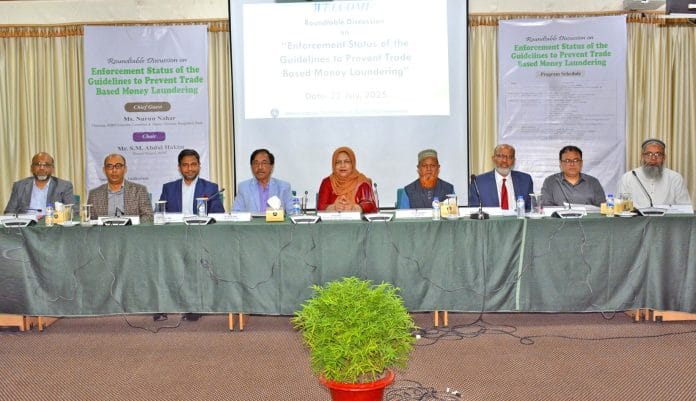A new research report by the Bangladesh Institute of Bank Management (BIBM) has revealed that Trade-Based Money Laundering (TBML) remains a significant and under-addressed threat to the country’s economic stability, draining billions of dollars annually through mis invoicing, false declarations, and phantom shipments.
Titled “Enforcement Status of the Guidelines to Prevent Trade-Based Money Laundering,” the report highlights that Bangladesh loses up to $16 billion annually—equivalent to 3.4% of its GDP—through trade-related illicit financial outflows, primarily concentrated in textiles, consumer goods, and petroleum imports.
The research, backed by BFIU officials, senior bankers, and academics, emphasizes the systemic risk TBML poses to customs revenue, foreign exchange reserves, and industrial policy planning.
Despite the adoption of global guidelines and national frameworks, including BFIU’s 2019 TBML Guidelines and AML laws, the enforcement on the ground remains uneven. A survey of 37 banks revealed that while 100% of them have sanction screening mechanisms, only 50% use price verification tools, and many rely on manual judgment due to high subscription costs of digital tools.
“Effective TBML prevention requires synchronized action across banks, customs, and financial regulators,” said Dr. Shah Md. Ahsan Habib, lead author of the report. “But gaps in real-time data integration, beneficial ownership transparency, and compliance culture continue to undermine enforcement.”
Among the key findings:
- Trade misinvoicing siphoned off an average of $8.27 billion annually between 2009 and 2018.
- Only 65% of banks have implemented the mandatory Uniform Price Template for cross-checking trade values.
- Just 45% of banks have subscribed to recognized price verification databases like Global Trade Tracker (GTT).
- Sanction screening coverage is limited, failing to detect nearly half of OFAC-related cases.
- Enhanced Due Diligence (EDD) for high-risk clients remains poorly implemented.
The report compares Bangladesh’s progress with best practices in countries like Singapore, Finland, Sri Lanka, and Chile—where multi-agency coordination, advanced analytics, and regulatory transparency have tightened TBML controls. It calls for the establishment of a dedicated Trade Transparency Unit, greater automation in customs oversight, and a public beneficial ownership registry to combat shell companies and hidden beneficiaries.
Failure to address TBML risks, the report warns, could result in FATF grey-listing, restricted correspondent banking, and loss of investor confidence, making it costlier for exporters and financial institutions to access global markets. The BIBM study concludes with a strong message: “Closing the TBML enforcement gap is not just about compliance; it is about national revenue protection and economic competitiveness.”

